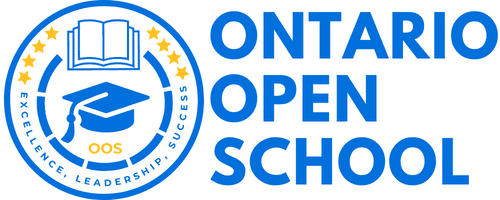- info@ontarioopenschool.com
- 647-494-4499
-
Unit 100 - 29 Gervais Drive, North York, ON.
M3C 1Y9
Copyright 2024 Ontario Open School Inc. All Rights Reserved.
This course emphasizes the consolidation of literacy, communication, and critical and creative thinking skills necessary for success in academic and daily life. Students will analyze a variety of informational and graphic texts, as well as literary texts from various countries and cultures, and create oral, written, and media texts in a variety of forms for practical and academic purposes. An important focus will be on using language with precision and clarity and developing greater control in writing. The course is intended to prepare students for college or the workplace.
Unit Order | Unit Name | Suggested Time |
|---|---|---|
| Unit 1 | Can you be a bystander in life? In this unit students will focus on the following main ideas: Conflict is essential for human development. | 24 hours |
| Unit 2 | Modern Anthology The stories chosen for this course have been written in recent decades and deal with situations that are familiar and interesting to students at this level. Short lessons on style are integrated into the study in this section in order to make matters such sentence structure, punctuation, and transitional devices more relevant to the work at hand. Similarly, the short poems in this unit reflect on topics that appeal to 4C students. Rather than study poetry solely for its technical merits, these lessons encourage students to reflect on larger issues they face. Topics such as new technologies, travel, life in the city, and relationships with parents form a familiar backdrop to the reading and thinking students do in this unit. Rather than the traditional assignment on poetry analysis, students write their own poetry by easing into the process through brainstorming, writing a free verse poem, and finally, including devices such as rhyme. The poems are then presented in an online poetry workshop in which peers and teachers respond to the lines students produce. | 27 hours |
| Unit 3 | eZines In a world that is becoming increasingly dominated by visual imagery, it is no surprise that magazines continue to attract a great deal of attention. While the publications continue as always, the formats have changed from hard copy versions and conventional subscriptions to eZines which are published entirely online. Students commonly refer to both formats, so this unit allows students to study online and hard copy texts and to reflect on how they are both similar yet different from each other. Aspects such as cover art, the editorial, and a feature article come under scrutiny as students consider the vocabulary of publishing, how new technologies become part of online publishing through blogs and videos, and the future of conventional mass market publishing in the magazine industry. To end the unit students will produce their own eZine which includes a cover page, an editorial, a feature article, and a link to a video that complements the content featured in the eZine. | 27 hours |
| Unit 4 | Novel Study – Jimmy Comes Home Students will read and analyze Robert Checkwitch’s Jimmy Comes Home. Students will be asked to participate in discussion forums where they will respond to a scenario and create their own opinions based on what they read. Students will compare their own lives to the lives of characters on Green Star Lake review. Students will examine various themes throughout the novel in preparation for their final writing task. At the end of the unit, students will write a five-paragraph essay in MLA format on the themes and characters in the novel. | 24 hours |
| Final Evaluation 30% | Final Project Final Exam | 6 hours 2 hours |
| Total | 110 Hours |
A wide variety of instructional strategies are used to provide learning opportunities to accommodate a variety of learning styles, interests and ability levels. These strategies include, but are not limited to:
Purpose
The primary purpose of assessment is to improve student learning. Assessment relates directly to the expectations for the course.
A variety of assessments for and as learning are conducted on a regular basis to allow ample opportunities for students to improve and ultimately demonstrate their full range of learning and for the teacher to gather information to provide feedback. Assessment tasks relate to the success criteria set out in lesson plans. Success criteria allow students to see what quality looks like.
Evaluation is the process of judging the quality of student work in relation to the achievement chart categories and criteria and assigning a percentage grade to represent that quality. Evaluation is based on gathering evidence of student achievement through:
Assessment for Learning – we provide feedback and coaching. Assessment FOR Learning is the process of seeking and interpreting evidence for the use of learners and their teachers to decide where the learners are in their learning, where they need to go, and how best to go there.
Assessment as Learning – we help students monitor progress, set goals, reflect on their learning
Assessment AS Learning is the process of the explicit fostering of students’ capacity over time to be their own best assessors, but teachers need to start by presenting and modeling external, structured opportunities for students to assess themselves.
Assessment of Learning – we use assessments to provide evaluative statements about student achievement. Assessment OF Learning is the assessment that becomes public and results in statements of symbols
(marks/grades/levels of achievement) about how well students are learning. It often contributes to pivotal decisions that will affect students’ future.
ASSESSMENT TOOLS
| Units | Duration | Overall Expectations | AFL | AAL | AOL | K
25% |
A
25% |
C
25% |
T 25% |
||
|
70% |
A | 25 hours | A1-A3 | Worksheets
Class Discussion |
Peer Assessment
Discussion Forum Self-Assessment |
Project | √ | √ | √ | √ | |
| B | 30 hours | B1-B4 | Worksheets
Class Discussion Video |
Questionnaire
Survey Discussion Forum Self-Assessment |
Project | √ | √ | √ | √ | ||
| C | 30 hours | C1-C4 | Worksheet
Class Discussion |
Learning Log |
Assignment |
√ | √ | √ | √ | ||
| D | 25 hours | D1-D4 | Worksheets
Videos
|
Reflective Discussion
Self-Assessment |
Assignment | √ | √ | √ | √ | ||
| 30% | A1-D4 | and Final Exam 30% (Written Component) |
√ |
√ |
√ |
√
|
|||||
Resources
Grading
Weighting of categories
| Knowledge/Understanding | Thinking/Inquiry | Communication | Application |
| 25% | 25% | 25% | 25% |

Course Grade | Grade 12 |
|---|---|
Course Code | ENG4C |
Course Category | English |
Course Type | College Preparation |
Course Delivery | Online |
Course Duration | 110h |
Course Credit | 1.00 |
Copyright 2024 Ontario Open School Inc. All Rights Reserved.
